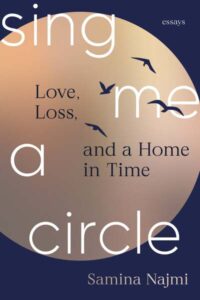Expat memoirs, even (or perhaps especially) of the East Asian variety, are a venerable genre. One suspects that even in the early days, what authors presented as new and exotic, probably wasn’t really. In these days of ubiquitous travel videos on YouTube, this is probably even more the case. As a result, such books need a good raconteur or prose stylist to pass muster. Fortunately, Connla Stokes is both.
Essays
Political memoirs or, worse, philosophical treatises by political leaders, are often books best avoided. Yet Anwar Ibrahim’s recent Rethinking Ourselves is nonetheless one the most erudite collection of essays out in this or any recent year.

“All points on a circle are always the same distance from the center.” These exquisite personal essays trace the orbit of Pakistani-American author Samina Najmi as she reflects on events, people, and places that shape her traditional childhood in Pakistan and continue to inspire her as she pursues her dreams of education and travel, enlarging her vision and experience of the world.
Anyone who has enjoyed learning a second language knows how productive the exchange between a first and second language can be. Yoko Tawada has published fiction and nonfiction in Japanese and German and demonstrates this principle more than most, having moved to Germany as an adult in 1982. She positions herself not as an immigrant author, but as “exophonic”, referring more generally to “existing outside of one’s mother tongue.”
“Writers on writing” is a genre in itself, one to which readers flock. However, Indian authors, especially those writing in regional Indian languages, are rarely represented in this genre meant for the internationally-acknowledged the-Western-and-the-famous. Therefore, Hindi writer Geet Chaturvedi’s The Master of Unfinished Things, translated into English by Anita Gopalan, will come as a breath of curious air.
Released in late 2024, 100 years after the most infamous mountaineering event in history, Other Everests: one mountain, many worlds is not a retelling of the Mallory expedition, but rather an attempt to widen the framing of Everest beyond western mountaineering exploits. Everest has often been seen through the eyes of western explorers and been limited to tales of heroic exploration. This book is a direct attempt to change that and bring “together new perspectives on the historical and cultural significance in the modern world.”
Chronic pain can be extremely frustrating to sufferers, especially as there are often no direct causes and can be hard to resolve. While pain may be linked to personal trauma, it can also extend to family and even historical events. In Nervous, Filipino-American writer Jen Soriano links all these in 14 thought-provoking, poignant personal essays about her childhood, family background, activism, and the Philippines, where her parents came from. In short, this is a book about personal, family and communal pain.
Anne Anlin Cheng grew up in Taiwan and moved to Savannah, Georgia with her parents and brother as a school-aged girl. Having learned English as her second language, she majored in English literature in college (“to my parents’ horror”), earned a PhD, published books on race and gender, and worked her way up the ladder of the professoriate at Princeton University. Then one day, she lost herself.
Baseball’s introduction to the Philippines. The slot machine trade between Manila and Shanghai. A musical based extremely loosely on the life of the sultan of Sulu.
The “barren rock” in question is Hong Kong and the tales aspire to give a portrait of the territory through the eyes of some long-term residents. When visiting abroad, people from Hong Kong are often asked, “How have things changed since the Chinese took over?” These tales don’t address that question directly, but they span the period of the Chinese takeover in 1997 and very successfully evoke the life of one section of the population before and after. For anyone who has lived there and left they will appeal as evocative reminiscences.

You must be logged in to post a comment.